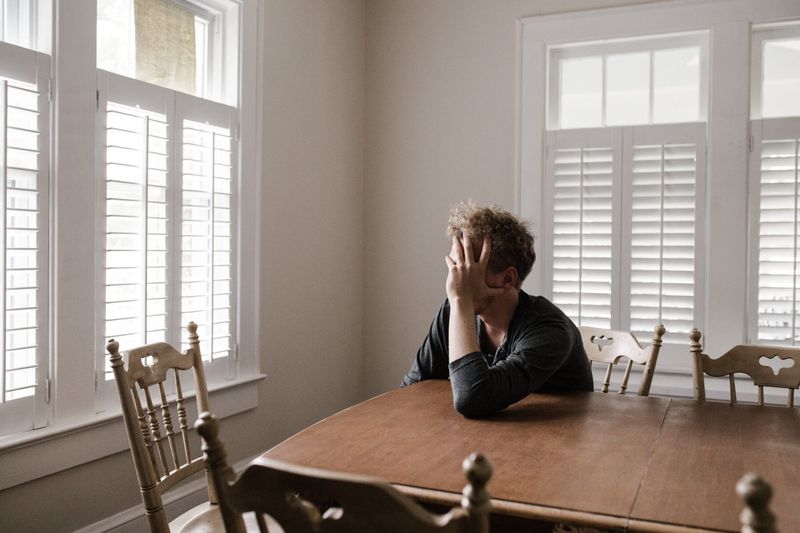15 Subtle Signs Your Husband Might Be Unhappy In The Marriage

Marriage is a journey filled with ups and downs. Sometimes, a husband may feel unhappy without it being immediately obvious. Recognizing these subtle signs can foster understanding and communication, helping to address underlying issues.
This post compassionately explores 15 signs that might indicate your husband is experiencing discontentment in the marriage. It’s essential to approach these signs with empathy and a willingness to connect, rather than with blame.
1. He Stops Sharing His Daily Life

There once was a time when he wouldn’t stop talking about his day. Now, silence seems to fill the gaps where stories once flourished. A lack of sharing can indicate a disconnect or feeling of isolation.
When a husband no longer includes his partner in the mundane or exciting details of life, it may signal unhappiness. This shift might be subtle at first but gradually becomes noticeable.
Encouraging open dialogue and showing interest in his experiences can bridge this communication gap. Offering a safe space to share without judgment can reignite the desire to connect.
2. He Pulls Away from Physical Affection

In the warmth of touch, we find connection. When a husband starts to pull away from physical affection, it could be a sign of emotional turmoil.
The absence of hugs, kisses, or gentle touches may suggest that he feels distant or overwhelmed. Sometimes, the withdrawal might not be intentional, but rather a reflection of inner struggles.
Approaching this change with sensitivity and understanding can open the door to healing. Explore alternative ways to reconnect, and express feelings of love and care without pressure.
3. His Humor Turns Sarcastic or Cold

Laughter is a window to the soul, but when humor turns dark or sarcastic, it might reveal underlying unhappiness. A once jovial husband who now leans into biting remarks could be masking frustration.
This shift can be subtle, manifesting in comments that cut rather than amuse. Recognizing this change is essential in addressing its root cause.
Engaging in an open conversation about how these remarks affect both parties can lead to a deeper understanding and potential resolution.
4. He Seems Preoccupied Even When You’re Together

Presence is a gift, yet when a husband seems miles away, even in close quarters, it might hint at dissatisfaction. A preoccupied mind often reflects unspoken worries or stress.
This behavior might not be immediately obvious, as it can be masked by routine interactions. However, the emotional distance can be felt over time.
Gently expressing concern and inquiring about his thoughts can create an environment where he feels comfortable opening up. Sometimes, all that’s needed is a patient ear.
5. He Avoids Making Future Plans

A shared future is built on plans and dreams. If your husband seems hesitant to commit to upcoming events or trips, it may reflect underlying discontent.
Avoidance of future planning can stem from uncertainty or a lack of enthusiasm for the relationship’s direction. This reluctance might be subtle, hidden beneath practical excuses.
By discussing hopes and aspirations, you can uncover what may be holding him back and work together towards a shared vision that excites both partners.
6. He Spends More Time in Silence Than Usual

Silence can speak volumes. When a husband chooses quiet over conversation, it might signal a deeper issue. The increase in silent moments can be gradual, often unnoticed until it becomes the norm.
This quietude may stem from feeling misunderstood or overwhelmed. It isn’t necessarily a withdrawal from the relationship but can indicate a need for internal reflection.
Opening a dialogue about his silence, and offering support, might encourage him to share his thoughts and feelings when he’s ready.
7. He’s Quick to Irritation Over Small Things

Patience can wear thin when underlying unhappiness simmers beneath the surface. A husband who becomes easily irritated over trivial matters might be struggling internally.
This change in demeanor often reflects unaddressed stress or dissatisfaction. It’s important to understand that these reactions are often more about personal struggles than the actual incidents.
Approaching the situation with empathy and patience can help diffuse tension and open the door for deeper conversations about what’s truly bothering him.
8. He Works Longer Hours Without Needing To

Longing for distraction can sometimes lead to overworking. If your husband is spending more time at work without apparent necessity, it might indicate a deeper unease.
The office becomes a refuge for those seeking to escape personal struggles at home. This behavior isn’t always about ambition but may be a way to avoid confronting marital issues.
Having a heartfelt conversation about why he’s spending so much time away can lead to insights and opportunities for reconnection.
9. He Rarely Asks About Your Day

Inquiring about your day used to be a ritual, but now, his interest seems to have waned. This lack of curiosity can be a sign of emotional withdrawal or a preoccupied mind.
When a husband stops engaging in this simple exchange, it may signal that he feels disconnected or self-absorbed in his own world.
Opening a dialogue about mutual interests and shared experiences can reignite his curiosity and encourage a renewed sense of partnership.
10. He Avoids Conflict—but Also Avoids Connection

Conflict is a part of any relationship, yet avoiding it altogether can be just as damaging. If your husband sidesteps disagreements but also shuns meaningful conversations, it might indicate a deeper issue.
This avoidance often masks a fear of confrontation or the pain of unresolved issues. The lack of connection might subtly erode the relationship’s foundation.
Approaching these topics with care and understanding can foster a sense of safety, encouraging him to engage in both conflict resolution and deeper connections.
11. He Turns to Friends for Support Instead of You

Friendships offer solace, but when a husband consistently turns to friends instead of his spouse for support, it may signal marital discontent. The shift might not be intentional but can create feelings of exclusion.
This behavior might suggest that he feels more comfortable sharing certain aspects of his life with friends. It can be a subtle sign that he needs something different from the relationship.
Encouraging him to share his thoughts and feelings at home can rebuild the intimacy and trust needed for a strong partnership.
12. He’s Less Interested in Shared Activities

Activities once enjoyed together can become a chore when unhappiness creeps in. If your husband seems less enthusiastic about shared hobbies, it might indicate a deeper dissatisfaction.
This lack of interest could stem from feeling disconnected or disengaged. It often reflects a need for change or variety in the relationship.
Exploring new activities or revisiting old favorites with a fresh perspective might rekindle his interest and bring back the joy of shared experiences.
13. He Dismisses Your Concerns Instead of Engaging

Listening is an act of love, yet when a husband dismisses concerns, it can feel like a lack of validation. This behavior might indicate emotional fatigue or a reluctance to engage with deeper issues.
It’s not always a reflection of his feelings towards you but might signal his own struggles. This dismissal can create barriers to understanding and closeness.
Approaching the conversation with empathy and patience might encourage him to be more open and responsive to your concerns, fostering mutual understanding.
14. He Stops Offering Reassurance or Compliments

Words of affirmation are powerful, yet their absence might signal emotional distance. If your husband stops offering reassurance or compliments, it might reflect a disconnect in the relationship.
This change can be gradual, often unnoticed until the silence becomes deafening. The lack of positive reinforcement might be rooted in his struggles to connect emotionally.
Encouraging open communication about feelings and needs can help bridge the gap, inviting a return to the warmth of supportive words.
15. He Says “I’m Fine” More Than He Should

The phrase “I’m fine” often masks a myriad of emotions. When a husband frequently resorts to this response, it can be a sign of unexpressed feelings.
This phrase might hide frustration, sadness, or a sense of helplessness. It becomes a protective barrier against deeper discussions.
Gently probing beyond these words to understand what lies beneath can foster openness and trust. Creating an environment where he feels safe to express his true emotions is key to rekindling intimacy.
